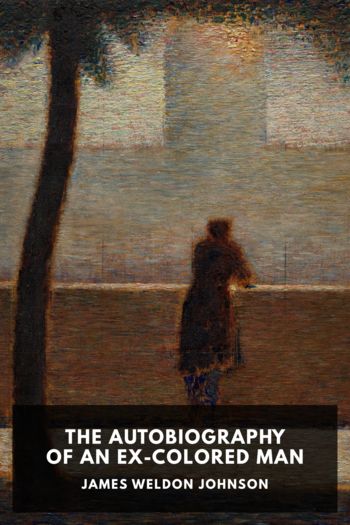The Autobiography of an Ex-Colored Man - James Weldon Johnson (best classic books of all time txt) 📗

- Author: James Weldon Johnson
Book online «The Autobiography of an Ex-Colored Man - James Weldon Johnson (best classic books of all time txt) 📗». Author James Weldon Johnson
He was what is called a regaliá workman, and earned from thirty-five to forty dollars a week. He generally worked a sixty-dollar job; that is, he made cigars for which he was paid at the rate of sixty dollars per thousand. It was impossible for him to make a thousand in a week because he had to work very carefully and slowly. Each cigar was made entirely by hand. Each piece of filler and each wrapper had to be selected with care. He was able to make a bundle of one hundred cigars in a day, not one of which could be told from the others by any difference in size or shape, or even by any appreciable difference in weight. This was the acme of artistic skill in cigar making. Workmen of this class were rare, never more than three or four in one factory, and it was never necessary for them to remain out of work. There were men who made two, three, and four hundred cigars of the cheaper grades in a day; they had to be very fast in order to make a decent week’s wages. Cigar making was a rather independent trade; the men went to work when they pleased and knocked off when they felt like doing so. As a class the workmen were careless and improvident; some very rapid makers would not work more than three or four days out of the week, and there were others who never showed up at the factory on Mondays. “Strippers” were the boys who pulled the long stems from the tobacco leaves. After they had served at that work for a certain time they were given tables as apprentices.
All of this was interesting to me; and we drifted along in conversation until my companion struck the subject nearest his heart: the independence of Cuba. He was an exile from the island, and a prominent member of the Jacksonville Junta. Every week sums of money were collected from juntas all over the country. This money went to buy arms and ammunition for the insurgents. As the man sat there nervously smoking his long, “green” cigar, and telling me of the Gómezes, both the white one and the black one, of Macéo and Bandera, he grew positively eloquent. He also showed that he was a man of considerable education and reading. He spoke English excellently, and frequently surprised me by using words one would hardly expect from a foreigner. The first one of this class of words he employed almost shocked me, and I never forgot it; ’twas “ramify.” We sat on the piazza until after ten o’clock. When we arose to go in to bed, it was with the understanding that I should start in the factory on the next day.
I began work the next morning seated at a barrel with another boy, who showed me how to strip the stems from the leaves, to smooth out each half leaf, and to put the “rights” together in one pile, and the “lefts” together in another pile on the edge of the barrel. My fingers, strong and sensitive from their long training, were well adapted to this kind of work, and within two weeks I was accounted the fastest “stripper” in the factory. At first the heavy odor of the tobacco almost sickened me, but when I became accustomed to it, I liked the smell. I was now earning four dollars a week, and was soon able to pick up a couple more by teaching a few scholars at night, whom I had secured through the good offices of the preacher I had met on my first morning in Jacksonville.
At the end of about three months, through my skill as a “stripper” and the influence of my landlord, I was advanced to a table and began to learn my trade; in fact, more than my trade; for I learned not only to make cigars, but also to smoke, to swear, and to speak Spanish. I discovered that I had a talent for languages as well as for music. The rapidity and ease with which I acquired Spanish astonished my associates. In a short time I was able not only to understand most of what was said at the table during meals, but to join in the conversation. I bought a method for learning the Spanish language, and with the aid of my landlord as a teacher, by constant practice with my fellow workmen, and by regularly reading the Cuban newspapers and finally some books of standard Spanish literature which were at the house, I was able in less than a year to speak like a native. In fact, it was my pride that I spoke better Spanish than many of the Cuban workmen at the factory.
After I had been in the factory a little over a year, I was repaid for all the effort I had put forth to learn Spanish by being selected as “reader.” The “reader” is quite an institution in all cigar factories which employ Spanish-speaking workmen. He sits in the center of the large room





Comments (0)